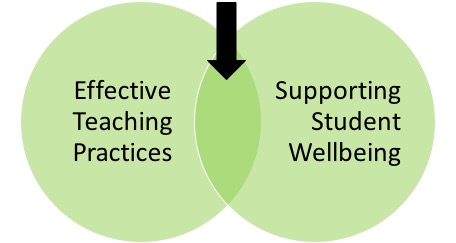Identifying the influence of teaching practices on undergraduate students’ mental health and wellbeing in the Faculties of Arts and Science
[watch video with closed captioning]
Studies have indicated that mental health and wellbeing are connected to a student’s ability to learn (Eisenberg, Hunt, & Speer, 2013; Keyes et al., 2012; Martin, 2010). Evidence also shows that different teaching practices affect student learning outcomes (Dennison, Gruber, & Vrbsky, 2010; Moulding, 2010; Svinicki & McKeachie, 2014). However, to date, it remains unknown whether teaching practices influence post-secondary students’ mental health and wellbeing and if so, how. This TLEF- funded project seeks to identify teaching practices that are effective at both promoting effective learning and supporting student wellbeing.

Year 1 of the project (2015-16) focused on data collection and analysis; year 2 of the project (2016-17) focuses on creating and sharing professional development resources for instructors.
Like to read about our published paper on this project:
Lane, K., Teng, M. Y., Barnes, S. J., Moore, K., Smith, K., & Lee, M. (2018). Using Appreciative Inquiry to Understand the Role of Teaching Practices in Student Well-being at a Research-Intensive University. The Canadian Journal for the Scholarship of Teaching and Learning, 9 (2). Retrieved from https://ir.lib.uwo.ca/cjsotl_rcacea/vol9/iss2/10
Lee, M., Wada, M., Cater, K., Goldman-Hasbun, J., Nga Le, T., Pang, M., Ma, C., Hambler P., Sun, C., & Jung, D. (2018). Conducting a university student mental health needs assessment using a participatory action research approach. SAGE Research Methods Cases. http://dx.doi.org/ 10.4135/9781526446664
Wada, M., Suto, M., Lee, M., Sanders, D., Sun, C., Le, T.N., Goldman-Hasbun, J. & Chauhan, S. (2019). University students’ perspectives on mental illness stigma. Mental Health & Prevention, 14, 200159. http://doi.org/10.1016/j.mph.2019.200159
References
Dennison, S. T., Gruber, K. J., & Vrbsky, L. (2010). Research literature review on social work education instructional methods: 1998–2008. Journal of Teaching in Social Work, 30(4), 399419.
doi:10.1080/08841233.2010.517732
Eisenberg, D., Hunt, J., & Speer, N. (2013). Mental health in American colleges and universities: Variation across student subgroups and across campuses. Journal of Nervous & Mental Disease, 201(1), 6067. doi:10.1097/NMD.0b013e31827ab077
Keyes, C. L., Eisenberg, D., Perry, G. S., Dube, S. R., Kroenke, K., & Dhingra, S. S. (2012). The relationship of level of positive mental health with current mental disorders in predicting suicidal behavior and academic impairment in college students. Journal of American College Health, 60(2),126133.
Martin, J. M. (2010). Stigma and student mental health in higher education. Higher Education Research & Development, 29(3), 259274. doi:10.1080/07294360903470969
Moulding, N. T. (2010). Intelligent design: Student perceptions of teaching and learning in large social work classes. Higher Education Research & Development, 29(2), 151165. doi:10.1080/07294360903470977
Written by Teaching Practices & Student Mental Health TLEF 2015-17 team [April 2016]
Thanks for this excellent research! As the trainer for our student mental health strategy at UVIC I have been sharing this with faculty. One individual said that she values connecting with students and works at connecting them with each other and that she finds student use of smartphones to be a barrier to that. I wondered if the use of digital media by students came up in your research at all.
Hi Dawn,
Thank you so much for your response. We are glad you find this site useful!
We acknowledge that smartphone use may be distracting in the classroom and become a barrier to peer and instructor connections. During student focus groups and instructor interviews we had feedback about how when instructors incorporate digital media into their courses it helped to engage students. Students also enjoyed having materials presented in different ways. For example some have really enjoyed learning through watching videos, classroom polls, etc.
Hope this helps. Again thank you for your comment 🙂
Really good site, thank you very much for your time in writing this post.
Thank you Leanne. We are glad you enjoy the posts!
What an interesting read, I have always believed that mental health and well-being are connected to a person’s ability to learn. I think it is extremely beneficial to learn more about the best choice of teaching practices that are effective for this area.
It makes perfect sense to me, that a student learning any new information, needs to be balanced emotionally and indeed physically, to ensure they absorb as much as they can from learning exercises and lessons.
Thanks for publishing this, very useful and thought provoking.
Regards
Zoe
Thank you, Zoe. We are glad you find the blog useful and thought-provoking!
We love to hear more about how you use the information in your daily work too.
Great post! The tips you shared are really practical and motivating. I especially appreciate the focus on sustainable habits rather than quick fixes. Looking forward to trying out the meal planning strategies you mentioned
Hi Rocco,
I look forward to hearing your experience in trying some of these strategies. Please feel free to bring new ideas to this blog and our community.